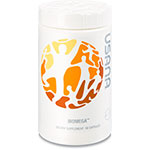 You’ve likely heard about the many health benefits of omega-3 fatty acids. Are you getting enough of them in your diet?
You’ve likely heard about the many health benefits of omega-3 fatty acids. Are you getting enough of them in your diet?
According to experts, probably not. And most people you know — your spouse, your toddler, and your mom – probably aren’t either.
“Pretty much everybody’s diet is deficient in omega-3s,” says David C. Leopold, MD, director of integrative medical education at the Scripps Center for Integrative Medicine in San Diego. “I think that’s why adding them back in seems to have so many health benefits. We’re just balancing out what’s normally” there.
Omega-3s are rapidly becoming an important tool in mainstream medicine. They seem to have health benefits for every age group – from before birth to old age. There’s conclusive evidence that they protect against heart disease and lower triglycerides. There’s also some research showing that they might help with dozens of other conditions, too.
To help you better understand the benefits — and some of the risks — of omega-3s, here’s a primer on using omega-3 fatty acids.
WHAT ARE OMEGA 3’s?
Omega-3s are essential fatty acids — we need them for our bodies to work properly. One of their most important benefits is that they seem to have an anti-inflammatory effect.
“A lot of diseases, like heart disease and arthritis, seem to be related to an inflammatory process,” says Leopold. “Omega-3s can tune down the body’s inflammation, and that may be how they help prevent some of these chronic diseases.”
So how do omega-3s benefit people at different ages? Here’s the rundown on the research.
CHILDREN:
Omega-3s are important for children’s health right from the start – actually, before they’re even born. Here’s some of the evidence.
- Cognitive development. Some studies show that infants fed formulas enriched with the omega-3 fatty acid DHA show improvements in hand-eye coordination, attention span, social skills, and intelligence test scores. Studies have shown that children born to mothers who took supplements of omega-3s (DHA and EPA) during pregnancy and the during the first months of breastfeeding scored higher on cognitive tests at 4 years of age compared to children whose mothers did not take supplements of DHA and EPA.
- Asthma risk. A 2008 study found that the teenage children of women who took fish oil during pregnancy were less likely to have developed asthma.
- Growth. There’s some evidence that when omega-3s are added to formula, it promotes growth and brain development in premature infants.
- Preterm labor. A 2003 study found that women who ate eggs enriched with omega-3s were less likely to go into premature labor than women who ate standard eggs.
***Although none of these studies are conclusive, there’s good reason to make sure that infants – and pregnant women — are getting their omega 3s.
CHILDREN AND TEENS:
Some of the childhood conditions that have been studied include:
- ADHD. Kids with ADHD may have lower levels of omega-3s in their bodies than normal, and a few small studies have looked at fish oil supplements as a treatment. They found that the supplements might improve behavior, reduce hyperactivity, and boost attention in kids under 12.
- Depression. Fish oil is often used as a treatment for depression in adults; there have been a few studies in children too. One small 2006 study of fish oil in depressed 6- to 12-year-olds found it helped their symptoms significantly.
- Diabetes. One small study looked at kids who were at high risk of developing type 2 diabetes. The researchers found that those who ate a high omega-3 diet were less likely to develop the condition.
- Asthma. Omega-3s may reduce inflammation in the airways, which could benefit those with asthma. One small study of 29 children with asthma found that those taking fish oil for 10 months had fewer symptoms than those who didn’t. However, other studies of omega-3s as an asthma treatment have not found consistent evidence that they help.
YOUNG ADULTS:
As an age group, young adults tend to be pretty healthy. But it’s a good time to start thinking ahead and considering your health in the long-term. So how can omega-3s help?
- Cardiovascular health. Studies have found that people who eat fatty fish twice a week have lower rates of heart disease. One study found that fish oil – in foods or supplements – cut the risk of death from cardiovascular disease by 32%. People with documented heart disease are advised to get about 1 gram of omega-3s from fish oil per day or to consider EPA plus DHA supplements.
- Cancer. So far, the evidence is not very strong. But a number of studies have noted that people who take in higher amounts of omega-3s seem to have lower levels of certain cancers. These include cancers of the breast, prostate, colon, ovaries, esophagus, and others. Are the omega-3s really responsible? It’s impossible to say. But the evidence is promising and more research needs to be done.
- Depression and other psychiatric conditions. There’s some fairly good evidence that omega-3s can play a role in brain chemistry and a number of studies have found some benefits. Several studies have found that blood levels of omega-3 fatty acids are lower in those who suffer from depression .
“We have studies showing that countries that have healthier diets — with more vegetables and fish — tend to have a lower incidence of depression than western countries,” says Ronald Glick, MD, medical director of the Center for Integrative Medicine at the University of Pittsburgh Medical Center.
At least a few studies have found that adding omega-3s supplements is beneficial for those suffering from depression. For instance, fish oil does seem to boost the effectiveness of some antidepressants. There’s also some early evidence that omega-3s might help with schizophrenia and the depressive symptoms of bipolar disorder. There’s some evidence that omega-3s may help with other conditions — ranging from skin conditions to painful menstruation to Crohn’s disease and inflammatory bowel disease.
MIDDLE AGED AND OLDER:
As you get older, the risks of serious conditions like heart disease grow. The good news is that omega-3s have their best established benefits in people of this age group.
- Heart health. “Omega-3s have enormous benefits from a cardiovascular standpoint,” says Erminia M. Guarneri, MD, a cardiologist and medical director of the Scripps Center for Integrative Medicine. Not only do they help prevent problems in healthy people, they also cut the risk of complications and death in people who already have heart disease. Omega-3s seem to help keep the heart rhythm steady. One study found that people who had already had a heart attack and took fish oil had a 45% decrease in the risk of heart-related death. Fish and fish oil also seem to slow down arteriosclerosis and lower the risk of strokes.
- Triglycerides. The omega-3s — DHA and EPA — can slash triglyceride levels by 20% to 50%. The effect seems to depend on the amount, so your doctor might recommend fairly high doses. The effects of omega-3s on other types of cholesterol are less clear.
- Rheumatoid arthritis. While the evidence isn’t conclusive, a number of studies have found that fish oil can reduce rheumatoid arthritis symptoms, like morning stiffness and pain. High doses – of 3 to 4 grams — may be necessary. No one should be on such a large dose without the supervision of a doctor.
- Osteoporosis. Studies have found that people who eat higher levels of fatty fish than average have greater bone density in the hip. One study found that fish oil – in combination with calcium and primrose oil – increased bone density in older people with osteoporosis.
- Memory, dementia, and Alzheimer’s disease. Several studies have found that diets high in fatty fish may help prevent memory loss and lower the risk of dementia in older people. However, other studies have not found a benefit. Recent studies have also evaluated whether the omega-3 supplement DHA can slow the decline seen in people with Alzheimer’s dementia or in age-associated memory impairment. One recent study showed that DHA can be a beneficial supplement and may have a positive effect on gradual memory loss associated with aging.
WHERE TO GET OMEGA 3s?
What’s the best way to get your omega-3s? Improve your diet and add a supplement, experts say.
Fatty fish are a good source of DHA and EPA. Although there are plant sources of omega-3s – in foods like flax, olive oil, and some leafy greens – they don’t seem to be quite as effective. Plants contain a fatty acid called ALA, which has to be broken down into DHA and EPA in the body.
Unfortunately, when it comes to Omega supplements one must be careful of the toxins that can build up in some seafood, such as shark, swordfish, and tile fish. By eating smaller fatty fish – like salmon and trout – you can limit your.risk of toxins, but not completely. Therefore, a pure Omega 3, like USANA’s BiOmega is the perfect alternative.
 What makes BiOmega exceptional is that it has all the benefits of fish oil in a convenient gel capsule, and it is free of harmful contaminants like mercury because of its double distillation process. It also contains concentrated doses of DHA, a beneficial fat that supports memory and learning, and is greatly recommended for pregnant women. And BiOmega contains an additional dose of vitamin D, a nutrient found deficient in the average diet. BiOmega is also formulated with lemon oil to kill the fishy aftertaste found in other fish oil supplements.
What makes BiOmega exceptional is that it has all the benefits of fish oil in a convenient gel capsule, and it is free of harmful contaminants like mercury because of its double distillation process. It also contains concentrated doses of DHA, a beneficial fat that supports memory and learning, and is greatly recommended for pregnant women. And BiOmega contains an additional dose of vitamin D, a nutrient found deficient in the average diet. BiOmega is also formulated with lemon oil to kill the fishy aftertaste found in other fish oil supplements.
AND FOR KIDS…
 USANA offers BiOmega Jr. Nearly 80 percent of children in North America are estimated to be deficient in omega-3s. Fortunately, it’s easy to give your child a smart start for lifelong good health with USANA’s high-quality omega-3 supplement for kids, BiOmega Jr. This delicious orange-pineapple flavored gel offers a highly absorbable form of omega-3 fatty acids EPA plus DHA in a delicious, creamy gel that that kids love. And because it comes in single-serve packets, it’s easy to give kids on the go.
USANA offers BiOmega Jr. Nearly 80 percent of children in North America are estimated to be deficient in omega-3s. Fortunately, it’s easy to give your child a smart start for lifelong good health with USANA’s high-quality omega-3 supplement for kids, BiOmega Jr. This delicious orange-pineapple flavored gel offers a highly absorbable form of omega-3 fatty acids EPA plus DHA in a delicious, creamy gel that that kids love. And because it comes in single-serve packets, it’s easy to give kids on the go.
